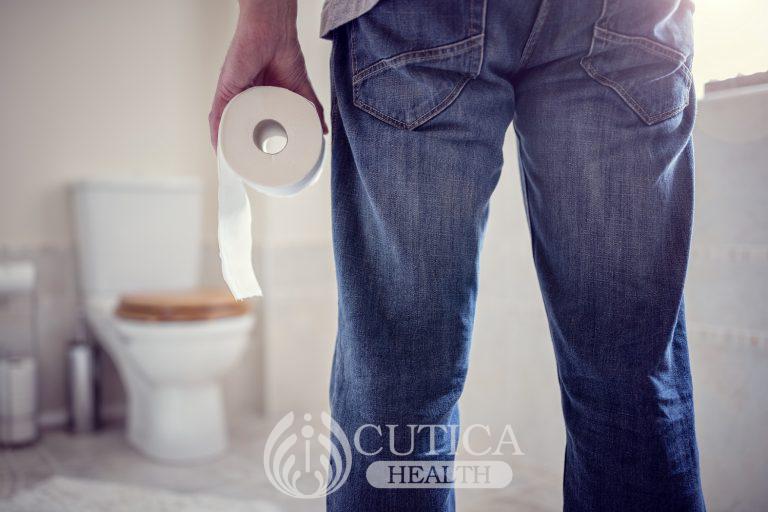
Read Article in Pidgin – https://cuticahealth.com/pidgin-articles/2020/01/blood-for-inside-shit-no-do-siddon-look/
No one needs to be told that it’s abnormal to excrete bright red liquid substance, or for stool or tissue paper to be streaked with such. The first time this occurs, a typical person would be alarmed and is likely to spend at least a few minutes thinking about possible explanations for the unwelcome sight. Questions such as, “is this really blood?” and “what might have caused this?” are certain to cross the person’s mind. Indeed, rectal bleeding is invariably a symptom of an underlying diagnosis. It is important to get to the bottom of the underlying problem and not simply psych oneself into believing that all is well.
Rectal bleeding may occur during painful defecation. This is what happened to Kole, a 20-year-old university student, who just doesn’t like to drink water. Kole is used to straining to push out hard stool several times each week. Earlier today however, his stool was not only hard as usual, but was streaked with bright red blood, and the whole process was painful. An hour later, he is feeling miserable and struggling to find a comfortable siting position in class.


Well, it is likely Kole has hemorrhoids (piles) or anal fissure. Hemorrhoids and anal fissure are two of the most common causes of rectal bleeding, and are often associated with constipation and straining during bowel movement. Hemorrhoids are swollen blood vessels in the anus (the opening where stool comes out of) or the rectum (the part of the bowel right above the anus). They may present with itching, pain, or bleeding. In some cases, hemorrhoids cause painless bleeding. Anal fissure, on the other hand, is due to a tear in the lining of the anus. As you can imagine, this tends to be painful. Increased fluid and fiber intake, stool softeners, and siting in warm water for 15-20 minutes a few times day (Sitz bath) are some remedies to obtain relief. Healthcare providers can provide advice on creams and ointments or other treatments.
Sometimes, bloody stool occurs as part of other symptoms such as diarrhea, abdominal pain, or fever. In such cases, the symptoms may be due to a single underlying cause such as an infection. Much less commonly, this combination of symptoms may be due to bowel inflammation without infection. Because the symptoms are multiple, people tend to seek medical help. This is the right thing to do, and is better than self-diagnosis or trial and error self-medication.


What about bleeding without pain, diarrhea, fever or any other symptom? While painless rectal bleeding can occur with hemorrhoids, a few serious conditions can also cause this. Here is the bottom line: passage of bloody stool without pain should not be ignored. It is wise to seek medical evaluation and undergo diagnostic tests as needed.
A good example here is Zainab, a 52-year-old business executive, who first noticed blood in her stool while on a business trip. She got worried about it and began checking her stool carefully everyday. “If it happens again, I’ll see Dr. Kuti ”, she told herself. However, when painless bleeding recurred 6 weeks later, she assured herself, “thank God, it’s not as bad as the first time”. Zainab stopped checking her stool compulsively and eventually forgot about it. Two years later, she started passing bloody stool again, this time weekly. She saw Dr. Kuti, and was diagnosed with advanced cancer of the colon. The delayed diagnosis was very costly. Her colon cancer could have been curable two years earlier.
So, colon cancer is one of the causes of painless rectal bleeding. Other causes include colon polyps, which can lead to cancer, and diverticulosis, which is condition where the large bowel develops pouches from where bleeding occurs.


Remember than blood does not always appear red in stool. Bright red blood in stool is easily recognized as bleeding. On the other hand, blood in stool can appear black, like tar, if the source is higher up in the digestive system, such as from the stomach. So, be wary of black tarry stool. Some medications such as iron tablets or bismuth can give the stool a similar tarry appearance in the absence of bleeding.
You may need to see a specialist. Did you know that some doctors specialize in the care of bowel problems? These doctors, called gastroenterologists, work closely with family doctors and other primary care providers to take care of bowel and related conditions. Also, some surgeons, called colorectal surgeons, specialize in bowel, anal and rectal surgery. These experts are trained to use special procedures such as colonoscopy or sigmoidoscopy, where special devices are used to directly examine the inner lining of the bowels. Family doctors and other primary healthcare provider are in the best position to offer advice on when a specialist is needed.
Since prevention is better than cure, take care of your bowels to lower your risk of disease. The bowels are large organs that deserve attention like every other part of your body. Simple measures to improve overall bowel health include selecting foods that have a high-fiber content, staying well hydrated, and exercising regularly. If you find yourself straining to pass hard stool, it’s time to check how well you are adhering to bowel-friendly practices. Short-term use of stool softeners may be beneficial if constipated. Finally, if you are over the age of 50 years or if someone in your family has had colon cancer in the past, talk to your doctor about your own risk and how to be screened. Remember that some cancers run in some families. The colon is not the only part of the bowel that can be affected by cancer; essentially any part of the bowel can be affected. Doctors are trained to assess each individual’s risk.
Summary
Proper attention to bowel health, and avoidance of constipation, can lower the likelihood of developing some of the conditions that cause rectal bleeding. While there are simple remedies to ease common causes such as hemorrhoids and anal fissure, do not ignore rectal bleeding that may be from other conditions. The key to a successful outcome is to find and treat the underlying cause of bleeding.












